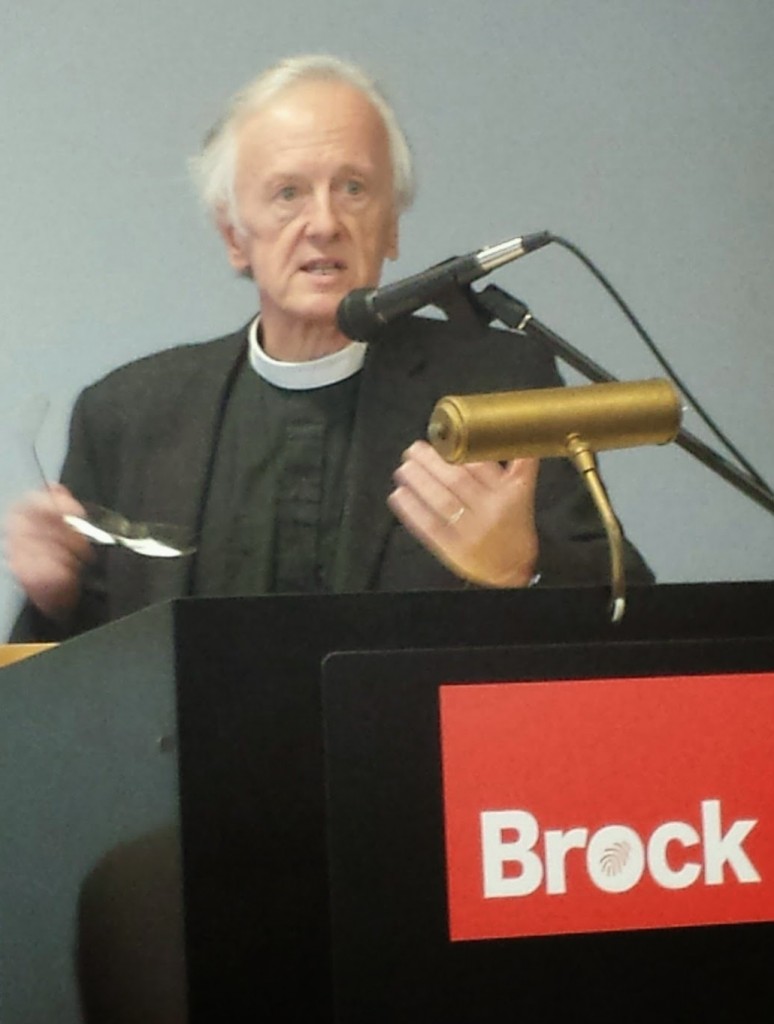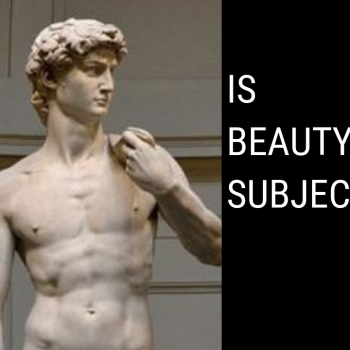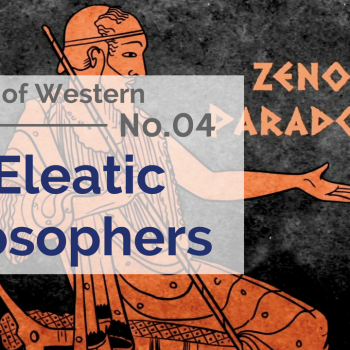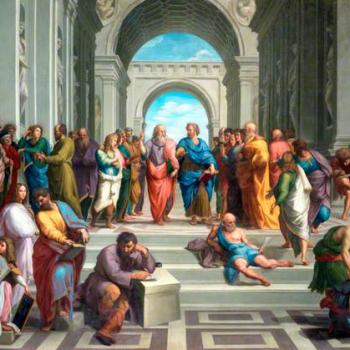
A paper delivered at the Brock University Philosophical Society on Thursday, 18 September 2014.
As an historian of theology I cannot avoid the history of philosophy, and because at certain periods of history these two tributaries of thought have come together in almost a common river, I wish I had more than a dilettantish grasp of philosophy from the Pre-Socratics to the present day. Perhaps the most significant episode in my own (inadequate) philosophical formation happened through listening to the lectures of the philosophical theologian Donald MacKinnon (1913-1994) in Cambridge some forty years ago. Professor MacKinnon’s take on Kant, whom he loved, versus David Hume, whom he hated, has stayed with me over the decades, as has his exposition of Karl Barth’s debate with the Thomist Erich Pzywara. Most memorable for me, though, and most entertaining for my students are Professor MacKinnon’s many personal eccentricities, which had to be seen to be believed, but which had the advantage that one who sat at his feet cannot forget a word that he said.
The two tributaries I have mentioned were flowing into each other by the second century already. Irenaeus, Tertullian, and Hippolytus blamed Greek philosophy for the multifaceted Gnostic movement that almost sank the Catholic Church of that time. And yet Justin Martyr exploited the latent monotheism of Albinus and the Middle Platonists as he both defended and commended the Church’s faith to the Roman authorities and educated public of his day. But from the Church’s point of view the confluence of the two tributaries is rarely an unmixed blessing: Justin interpreted the Logos doctrine of John 1 in terms of Plato’s World Soul as a mediating deity inferior to the transcendent First God, setting the stage for two centuries of confusion and conflict that were not resolved till near the end of the fourth century.
It would take too long to tell the whole story of the zigzagging interaction of our two disciplines. Suffice it to say that theology cannot ultimately disentangle itself from philosophy. The young Luther railed against the “rancid philosopher Aristotle” and famously pronounced the Nicomachean Ethics “the worst enemy of grace—gratiae inimica pessima.” But by the end of his life Luther was speaking kindly of Aristotle again in certain contexts, and Lutheran Orthodoxy was almost as much stamped by a revived Aristotelianism as was contemporary Roman Catholic theology.
By the time we reach the Enlightenment, philosophy was nudging itself into the driver’s seat of Protestant theology on the European continent. To some extent Lutheran, Anglican, and Reformed divinity have since then accommodated themselves to the latest philosophical fashions. But a minority of theologians in these traditions, among whose company I hope I am found on the Last Day, have resisted the trend, not finding it impossible to leap across Lessing’s famous ditch, not accepting Kant’s ruling out of bounds the natural knowledge of God, refusing to succumb to Schleiermacher’s Spinoza-fuelled pantheism, declining to drink the heady potion of Hegel’s speculation that claimed to keep Christ while improving on Him, and not going along with Liberation theology’s approving use of Karl Marx.
As a Lutheran I don’t reject John Paul II’s Fides et Ratio out of hand and agree with a now departed Swedish friend and colleague that, while Lutheran theologians are never going to become Thomists pure and simple, we can and should acknowledge, on the basis of natural revelation and natural theology, a certain poor man’s version of the philosophia perennis.
But let this interdisciplinary exercise of having a mere theologian address a group of philosophers draw to a close by my throwing a cat among the pigeons. Saul of Tarsus was a bicultural first-century Jew equally at home in the world of liturgical Hebrew and colloquial Aramaic, on the one hand, and in that of koiné Greek and Hellenistic culture, on the other. With about twenty years as a believer in the crucified and risen Jesus of Nazareth, indeed, as one of His apostles, behind him, Paul wrote something less than a ringing endorsement of your venerable discipline from a prison cell in either Caesarea Maritima or Rome to the church of Colossae that had recently been founded by his fellow pastor, Epaphras. A lucid high school student would immediately pick up that Paul dares to associate philosophy with such, to him, negative phenomena as empty deceit, merely human lore, and the uncanny activities of fallen superhuman spirits:
See to it that no one makes a prey of you by philosophy and empty deceit, according to human tradition, according to the elemental spirits of the universe, and not according to Christ. For in him the whole fullness of deity dwells bodily (Colossians 2:8-9).
True, in one of his most heckled homilies, namely his address on the Areopagus recorded in Acts 17, Paul anticipated a Christian tradition leading from Justin Martyr to C. S Lewis by plugging natural theology, and he even quoted two Greek philosophers for good measure. Moreover, there is some evidence that he now and then chose his words in order to engage the attention of the philosophical community. But we need to grasp the nettle by the hand and state most forthrightly that, notwithstanding the many stimuli Christianity has received through its rubbing shoulders with philosophy and philosophers, the Church’s faith in general and her theology in particular live from revelation, from God’s disclosure of Himself and His will that began in Genesis 3:15 and that climaxed in the Word’s becoming flesh, in God’s Eternal Son becoming the Son of Mary, in short, in the Incarnation to which there is no access outside the inspired writings of the New Testament. In my student days I was perplexed by a statement Paul makes a few verses ahead of those I just quoted, in which he identifies Christ as “the mystery of God, in whom all the treasures of wisdom and knowledge lie hidden” (Colossians 2:3). Someone recently said that a mystery differs from a secret in that a secret, once known, ceases to be a secret, while when a mystery is made known it forfeits none of its numinous grandeur. Insofar as she is faithful to her divine Bridegroom, the Church revolves at all times around Him who declares of Himself that something greater than Solomon and greater than the Temple is here, but who also says, “Blessed is he who takes no offence at Me.” More significant than anything I do in the classroom, in the library, or at the word processor are the times when I preach a textually-based homily, convinced that the crucified, risen, and exalted Christ speaks through faithful exposition of His word, the times when I absolve a penitent “in the stead and by the command of my Lord Jesus Christ,” and supremely the times when He permits me to be an instrument in consecrating His adorable Body and Blood upon the altar. The two tributaries of our respective disciplines do indeed flow into one another, but under the microscope of the eyes that shall examine us all on the Last Day it may well be found that one is oil and the other water.
(All emphases original.)
+SDG+











